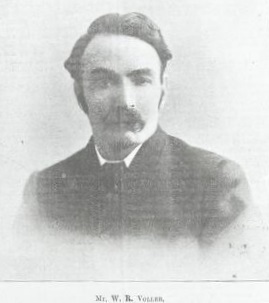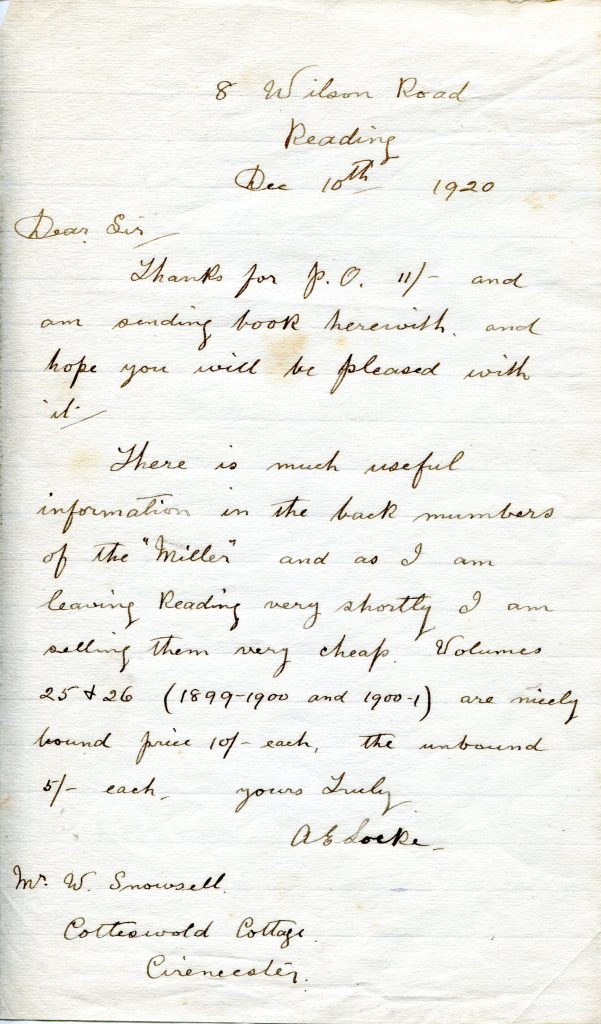Gems: Locke Letter
Within the Mills Archive library can be found a book. A book written by the author, William R. Voller. In fact there are many editions of this book starting from his first, in 1889, to his 3rd, in 1897. The book of interest as far as this article is concerned, however, is in fact the second edition. This book published in 1892 tells a story, a very ordinary story in one sense, the story of a baker, a miller, and a book.

We must first begin with William Voller. He wrote ‘a handbook for millers and others interested in the grain and flour trades’ under the title, Modern Flour Milling. This book contained information about the new process of roller milling and proved so popular that three editions were published in the space of 10 years. If one wished to learn about the milling industry, then Voller was who you turned to.
The second character in this tale is one Arthur Edward Locke. Born in Beverley, Yorkshire in 1886 he would only have been three when Voller’s work was first published. He next appears in 1911, aged 25, living in Reading, and working as a bread baker. This occupation meant that a piece of work that could have been of no interest to him aged three was now of great interest. This work could help him understand technical details within his trade and develop his skills.
However, the peaceful world of this local baker was about to be interrupted. War came to Europe and Arthur Locke, like so many other young men of his generation, joined the fight. Whilst he may physically have been abroad, his heart was left in Reading as a budding romance was torn apart. Yet for Arthur Edward Locke and Ellen White, a happy ending would be found. Married in St Peter Church on 11 December 1916, they would have to wait until the conclusion of the war in 1918 to fully begin their lives together, but live they did, settling on Wilson Road in Reading.

Meanwhile, in Gloucestershire, there had been a boy not old enough to fight in the war, a Mr. Walter Snowsell. He had only been born in 1902, so was 12 when the shadow of war was cast across Europe. His family had come from Cheltenham where they had been farmers, bakers and millers during the late 19th and early 20th century. Indeed, his great uncle, Elijah Snowsell, had run both Nafford Mill and a bakery on Cheltenham High Street, a business which made the family very wealthy. Walter’s father, Elijah Walter Snowsell, had left Cheltenham and moved to Cirencester c.1893. Although he had left his family home, he did not leave the family occupation of milling behind. He worked as a corn miller manager for Henry Cole and Co. Ltd., Costwold Mills, and remained in this situation till his death. Walter too wished to become a miller and follow in his father’s footsteps. Where should he turn to learn about his chosen profession? To none other than Voller. Where could he purchase such a book? From Mr. A. E. Locke.
On the 10th December 1920, Arthur Locke sent his copy of Voller to Walter Snowsell in Cirencester. With the book he included a letter thanking Mr Snowsell for his 11 shillings and sharing his hope that ‘you will be pleased with it’. Indeed, Walter may have been pleased enough to return to Locke with another order, this time for copies of the ‘Miller’ that had been offered at either 10/- or 5/-, depending upon whether the edition was bound or not.
The letter suggests that Locke may soon have been leaving Reading, but if he did, then it was only temporary for he died in Reading in 1929, aged only 43. Walter Snowsell meanwhile, had only married four years before this, in 1925, and lived a further fifty-six years dying a very wealthy man, he had clearly benefitted from Voller’s teachings!
So a short story about the lives of two different individuals who may never have even met. Their stories may have been lost were it not for one short letter. A letter of business and hope for further custom. Yet it is much more than that. It represents the sharing of knowledge, the passing of information from one generation to next; from a war veteran to a young apprentice; from a baker to a miller. Whilst it is no dramatic tale, it tells of a life of simple living, and the changes afoot during the 19th and 20th centuries.
Read about the importance of Voller’s Modern Flour Milling work on the British milling industry here.
